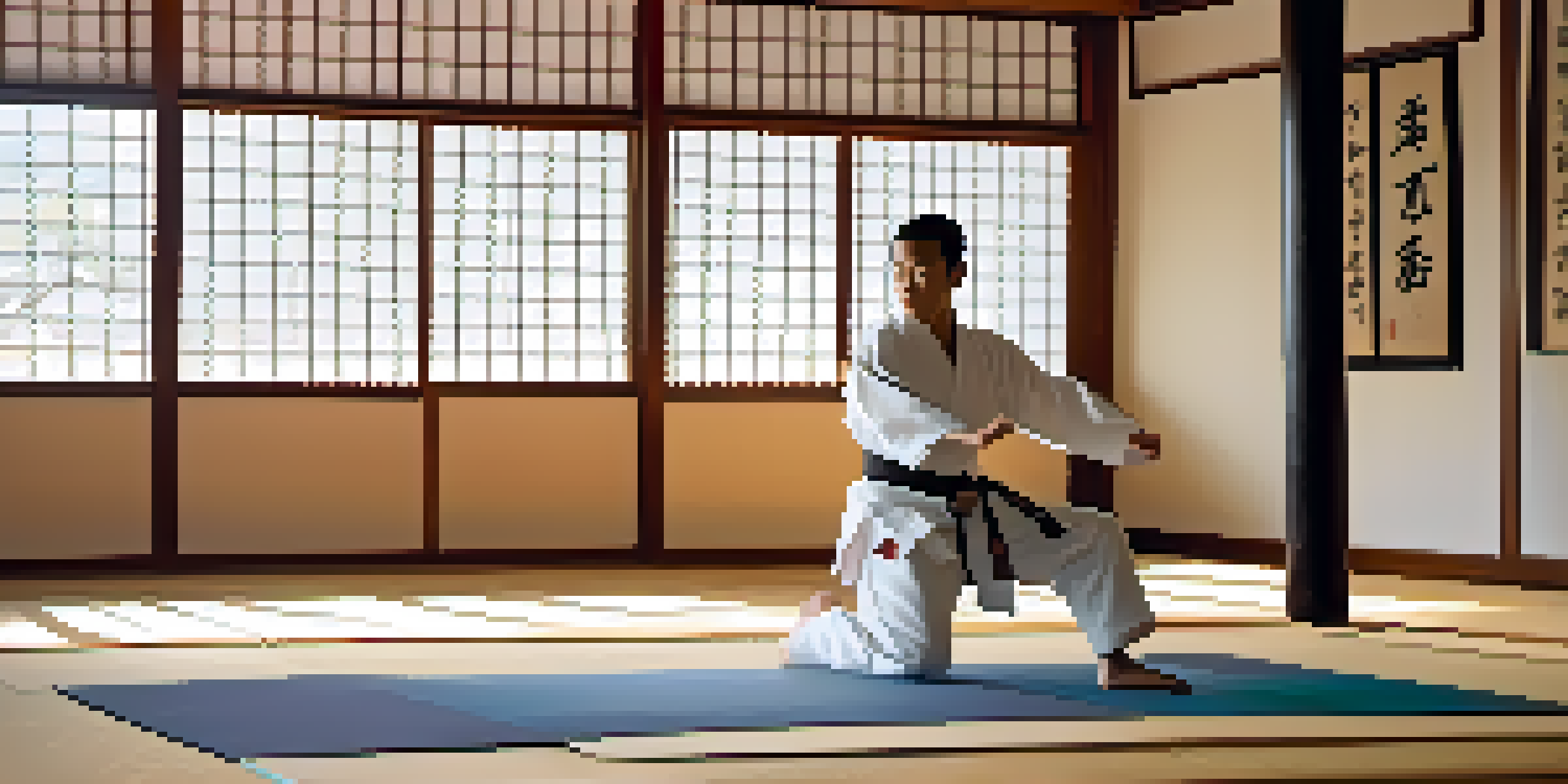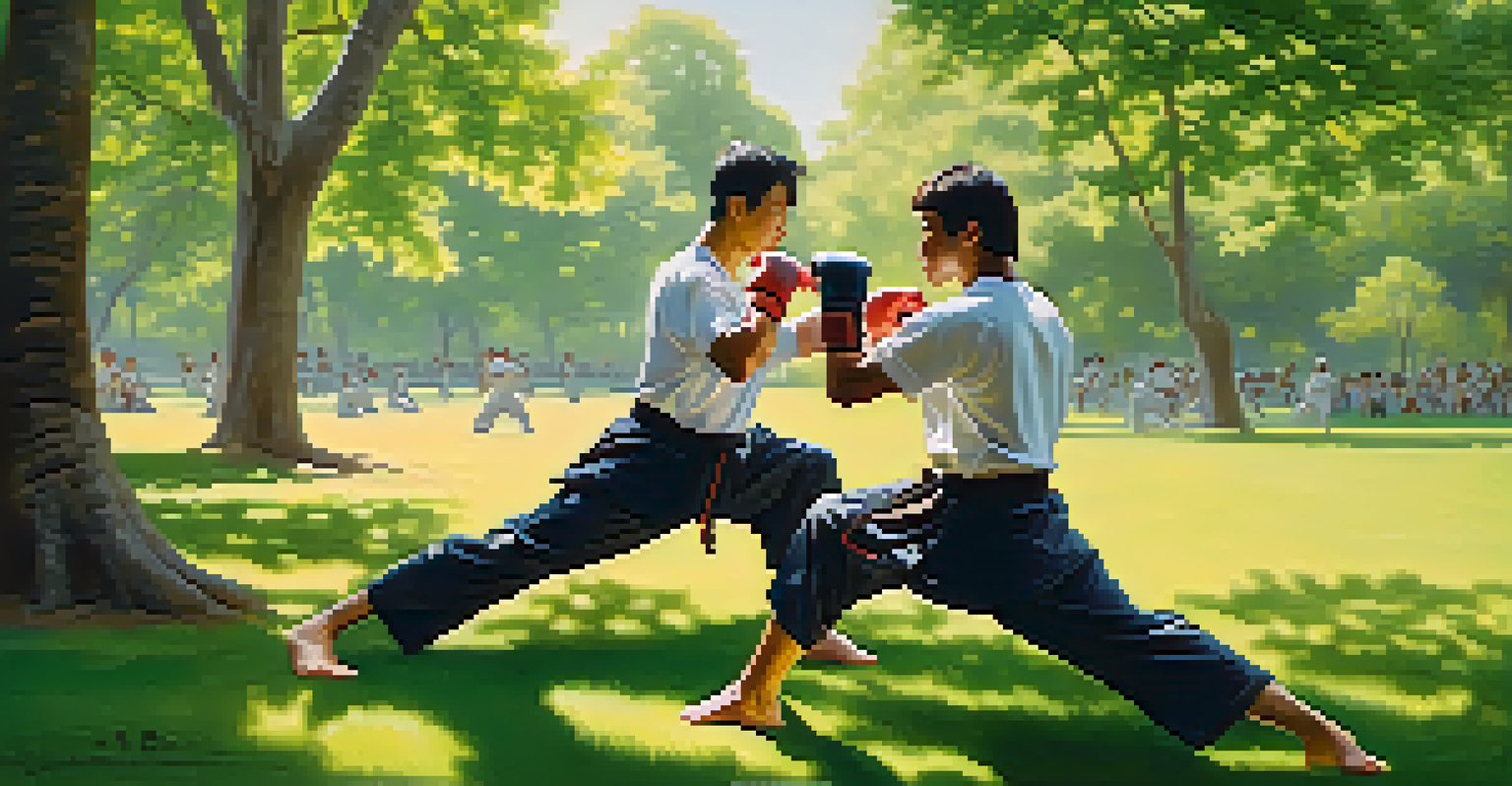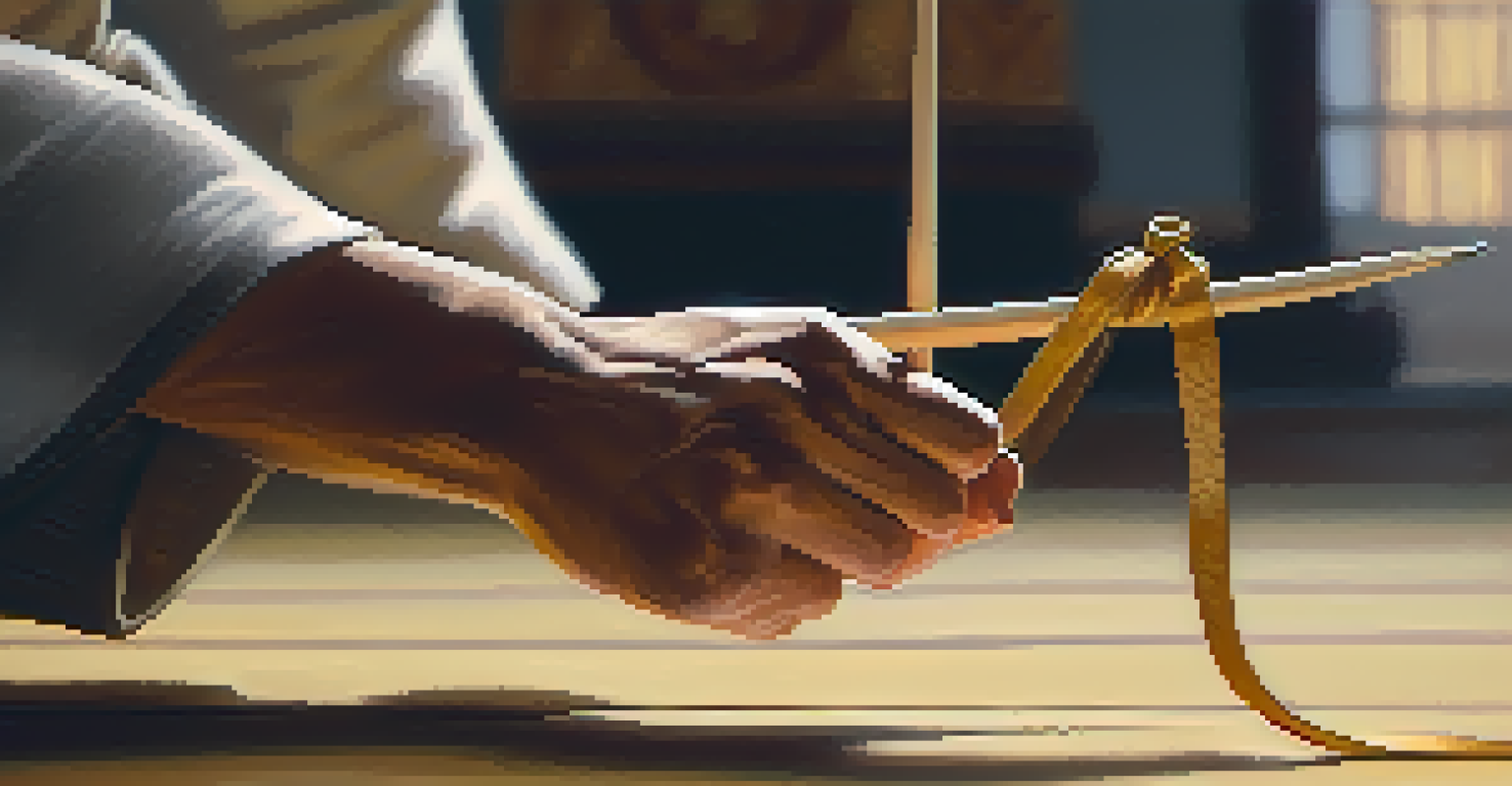The Philosophy of Martial Arts and Its Impact on Conflict

Understanding the Core Philosophy of Martial Arts
Martial arts is often seen as a physical discipline, but its roots run much deeper into philosophy. At its core, martial arts teaches values like respect, discipline, and self-control. These principles not only shape the fighter but also influence their approach to conflicts in everyday life.
The ultimate aim of martial arts is not having to use them.
The philosophical aspects of martial arts can be traced back to various traditions, such as Zen Buddhism and Confucianism. These teachings emphasize mindfulness and the importance of inner peace, suggesting that true strength lies not in aggression but in understanding oneself and others. This perspective fosters a mindset that prioritizes resolution over confrontation.
For practitioners, the philosophy of martial arts becomes a framework for navigating conflicts. By cultivating a balanced mind and a respectful attitude, martial artists learn to approach disagreements thoughtfully, often seeking peaceful solutions instead of resorting to violence.
The Role of Discipline in Conflict Management
Discipline is a fundamental tenet of martial arts, serving as both a training method and a life philosophy. This discipline teaches practitioners to control their emotions and reactions, which is essential when faced with conflict. Instead of responding impulsively, disciplined martial artists pause, reflect, and choose their responses wisely.

In moments of tension, a disciplined mind can make a significant difference. For instance, rather than escalating a disagreement, a martial artist might take a step back to assess the situation, leading to a more constructive dialogue. This approach not only diffuses potential violence but also fosters mutual understanding.
Philosophy Shapes Conflict Resolution
Martial arts philosophy teaches respect, discipline, and mindfulness, which help practitioners navigate conflicts peacefully.
Moreover, the practice of discipline extends beyond the dojo. Individuals who embody these traits in their daily lives often become role models in their communities. Their ability to manage conflicts calmly and effectively can inspire others to adopt similar strategies, creating a ripple effect of peaceful conflict resolution.
Mindfulness: A Key Element in Conflict Resolution
Mindfulness, a practice deeply embedded in many martial arts, encourages individuals to stay present and aware of their thoughts and feelings. This heightened awareness can be incredibly beneficial during conflicts, allowing practitioners to recognize triggers and avoid knee-jerk reactions. Instead of being swept away by emotions, they can respond with clarity and intention.
The greatest victory is that which requires no battle.
For example, a martial artist faced with an aggressive opponent might take a moment to breathe and center themselves before engaging. This practice can transform a potentially volatile situation into a more controlled interaction, ultimately leading to a resolution rather than further escalation. Mindfulness fosters an environment where dialogue can thrive over discord.
Additionally, cultivating mindfulness through martial arts can improve empathy. As practitioners become more attuned to their own emotions, they often develop a deeper understanding of others' perspectives, making it easier to address conflicts with compassion and care.
Emphasis on Respect: A Foundation for Peaceful Interactions
Respect is a cornerstone of martial arts philosophy, ingraining a sense of honor toward opponents, instructors, and even oneself. This respect is crucial when navigating conflicts, as it encourages individuals to view others not as enemies but as individuals with their own thoughts and feelings. This mindset shift can significantly alter the dynamics of a dispute.
Practicing respect allows martial artists to engage in discussions rather than confrontations. For example, when disagreements arise, they are more likely to approach the other party with openness and a willingness to listen. This respectful approach can pave the way for collaborative problem-solving, reducing the likelihood of escalation.
Discipline Enhances Emotional Control
The discipline learned in martial arts enables individuals to manage their emotions and respond thoughtfully during conflicts.
Furthermore, instilling respect within martial arts training can lead to broader societal changes. When individuals carry these values into their communities, they contribute to a culture of mutual respect and understanding, which is essential for peaceful coexistence.
The Concept of Harmony in Martial Arts
Harmony is a central theme in martial arts philosophy, representing the balance between opposing forces. This concept extends beyond physical combat, emphasizing the importance of finding equilibrium in all aspects of life, including conflict situations. Practitioners learn to harmonize their actions and intentions to create positive outcomes.
In practice, achieving harmony might involve negotiating differences with opponents or approaching a conflict with an open heart. For instance, a martial artist might engage in a dialogue to find common ground rather than resorting to aggression. This pursuit of harmony can lead to resolutions that honor the needs of all parties involved.
Moreover, a harmonious mindset encourages individuals to seek win-win outcomes rather than viewing conflicts as zero-sum games. By prioritizing collective well-being, martial artists contribute to a more peaceful society and demonstrate that conflicts can be resolved constructively.
The Transformative Power of Conflict in Martial Arts
Conflict, while often viewed negatively, can serve as a powerful catalyst for growth and transformation within martial arts. Each confrontation presents an opportunity for practitioners to learn about themselves, their limits, and their responses to stress. This perspective allows martial artists to embrace conflict as a natural part of their journey.
Through sparring and competition, martial artists confront not only their opponents but also their fears and insecurities. This exposure helps them develop resilience and adaptability, key traits that are invaluable in both martial arts and life. Embracing conflict as a learning experience ultimately fosters personal development.
Harmony Promotes Collaborative Solutions
The concept of harmony encourages martial artists to seek win-win outcomes and foster understanding in conflict situations.
Additionally, learning to navigate conflict effectively can empower martial artists to help others. With their experiences in resolving disputes, they can mentor peers and community members, guiding them toward peaceful conflict resolution and encouraging a culture of understanding.
Bringing Martial Arts Philosophy into Everyday Life
Integrating martial arts philosophy into daily life can profoundly affect how individuals approach challenges, especially conflicts. The principles of respect, discipline, and mindfulness can be applied in various situations, from workplace disagreements to family disputes. By consciously embodying these values, one can navigate conflicts more gracefully.
For example, using mindfulness techniques learned in martial arts can help individuals manage stress during heated discussions. Practitioners might take a moment to breathe deeply before responding, allowing for a more thoughtful and composed reaction. This practice not only benefits the individual but also sets a positive tone for the interaction.

Ultimately, embracing the philosophy of martial arts fosters a mindset that values peace and understanding. As more people adopt these principles, the potential for conflict resolution grows, creating a ripple effect that can lead to more harmonious communities.